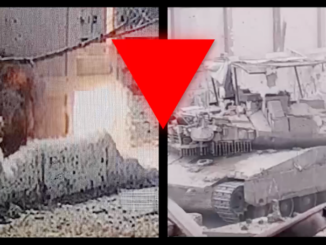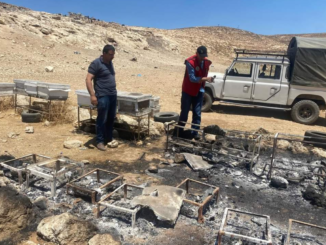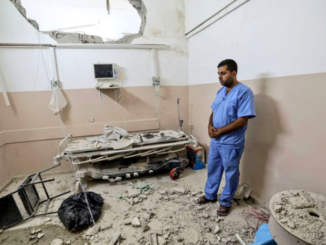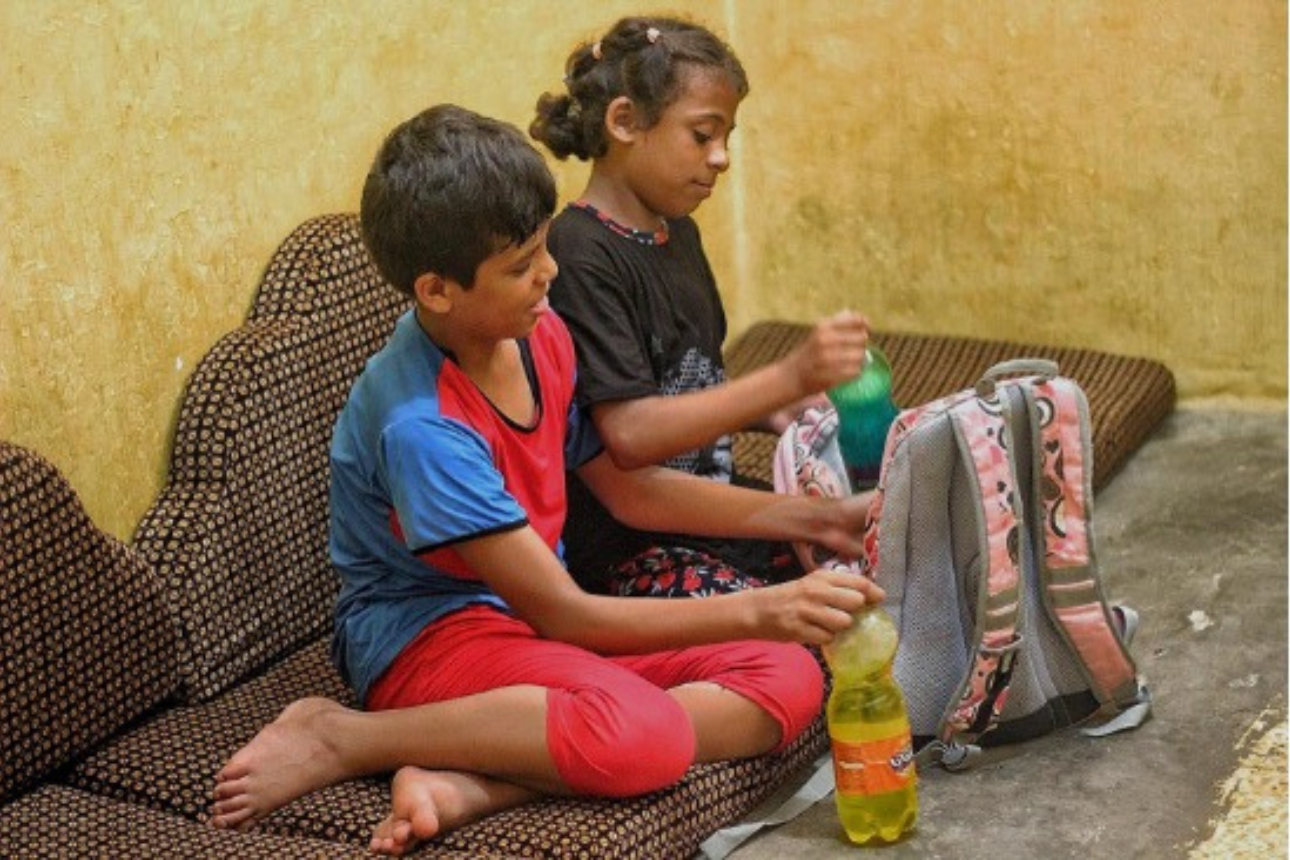
By Rania Taima
Two young siblings, one is blind and the other ill, sell cleaning supplies, made by their mother, to save their father’s life.
At the start of the summer break, last June 12-year-old Hamza Abu Mousa walked through the dusty streets of the Khan Yunis refugee camp, in the southern Gaza Strip, carrying a backpack filled with cleaning products.
Hamza is blind. He goes door-to-door in the refugee camp accompanied by his 9-year-old sister, Hanan, who also struggles with medical issues of her own. She guides his steps throughout the alleyways of the camp.
“After I woke up, washed my face, and ate my breakfast. Hanan and I had to leave quickly. We needed to sell products,” Hamza told the Palestine Chronicle.
“We take turns carrying the cleaning box so that we do not get tired,” Hanan explained.
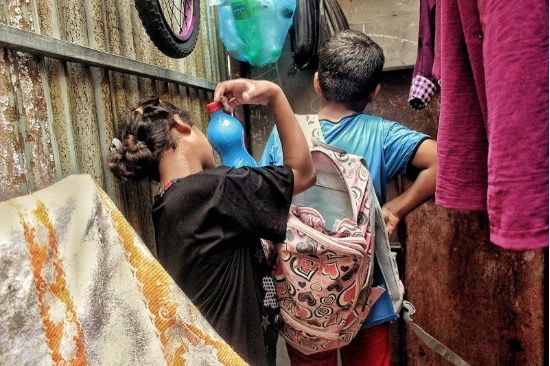
On that day, the two siblings had to return home by noon to deliver the money they had earned to their mother, Islam, and then take a short break.
Islam told us that she put caps on their children’s heads to shield them from the scorching sun.
“The heat drained my energy,” Hamza said.
“I am used to being tired,” his sister added. They said Hanan has health problems as well, although the diagnosis remains inconclusive.
Yet, despite the challenges, Hamza and Hanan consider themselves ‘lucky’ because they can attend school while working part-time.
According to a report issued by the Palestinian Central Bureau of Statistics in 2023, only 0.4% of children engaged in the labor market are enrolled in schools.
Fortunately, though, the percentage of employed children in Gaza is only 1%.
(Un)broken Dreams
The school day runs from 7:00 am to noon. When classes end, Hamza and Hanan start their working day. They sell bottles of detergents in the streets for one or two shekels apiece. The money they collect is needed to pay for the family’s groceries and their father’s medical treatment. Any additional money goes toward the cost of Hamza’s surgery, which the family still hopes to perform.
Five years ago, Hamza began studying at the Al-Noor Center for the Blind in Gaza City after losing his sight.
He suffered from retinal detachments in both eyes, which would have required urgent surgery. The family, however, could not afford the cost.
“$1,500 dashed our hope of restoring Hamza’s sight,” Islam told us.
Despite his condition, Hamza is an excellent student and aspires to become a policeman so that he can protect others.
“I was awarded a certificate of appreciation at school,” he told us, proudly.
Hanan has a dream of her own. She wants to become a doctor because she wants to heal people, and provide treatment and medicines for her family.
Both children still find time to have some fun and enjoy life. “We play games like ‘rock, paper, scissors’,” Hamza explained. “We also like drumming and building pillow forts.”
‘I am Beautiful’
Though much of the community is supportive, some are not.
Islam tells us that her children occasionally have some terrible experiences. Recently, some teenagers have physically assaulted and psychologically abused the two siblings.
“They beat up Hamza when he asks them to buy products from him,” Islam said. “They say Hamza is just pretending to be blind, and they make racist remarks on Hanan’s skin tone.”
“They told me I am not beautiful,” Hanan said, adding that they were derided for their tattered clothes.
Islam constantly tries to lessen the impact of the abuse by providing Hamza and Hanan with ways to defend themselves.
“Having confidence in yourself is the key to having confidence in everything else in life,” she tells them.
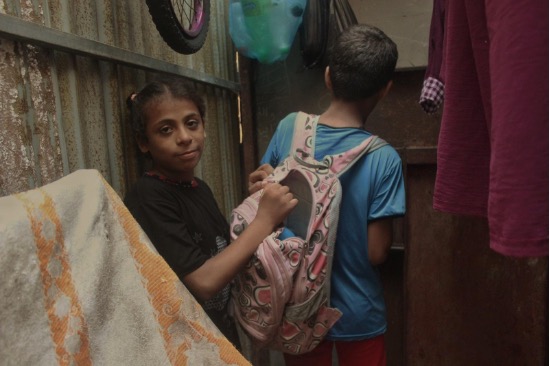
Surviving
Islam has six children. In 2019 and 2020, she was unable to provide her children with their basic needs.
“I rarely had one shekel to spend,” she said, in tears.
The family’s fortunes changed when Islam’s husband, Mohammed, was diagnosed with thyroid cancer.
The 41-year-old man had worked as an unskilled laborer for five years, earning 300 shekels ($80) a week at a stone factory. Overnight, he found himself unable to work.
Moreover, the financial aid provided to low-income families by Palestine’s Ministry of Social Development is no longer distributed on a regular 3-month basis. Instead, it is now provided only once or twice a year.
During the COVID-19 pandemic, Mohammed’s medical expenses increased, and the family’s financial situation gradually deteriorated. It was Islam who came up with the idea of making her own cleaning products that could be sold to support her family.
One of her main challenges was the lack of capital to begin the business. For two months, she took over one of her husband’s jobs packing food supplies at the United Nations Agency for Palestinian Refugees (UNRWA).
It was a difficult job, but, ultimately, it served a purpose. “The project gradually started to take shape,” she said.
Then, Islam bought three blue plastic storage barrels and cleaning ingredients that could be mixed to create various detergents, including dishwashing soap, floor cleaners, and bleach.
She works in her small home, sitting on the bare floor. The house lacks proper sunlight and ventilation, and it doesn’t have a direct water supply.
“We don’t have a water cistern or a motorized pump,” Islam said. “My sons have to fill buckets with water from the tank at the nearby mosque.”
Nevertheless, the situation is gradually improving.
“Our finances are getting better each day,” she said.
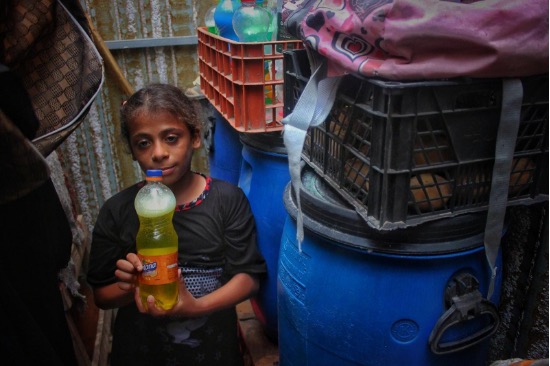
Alhamdulillah
But the challenges continue.
Mohammed’s medical expenses are high, and Islam must constantly purchase new supplies to produce cleaning ingredients. Hamza and Hanan have no alternative but to go back out into the street and work through the alleyways of their neighborhood.
“On the Eid al-Adha – one of two main Muslim holidays – Hamza and Hanan sold almost 30 bottles of detergent, earning around 50 shekels (approximately $14),” Islam told us. “It had never happened before.”
But after the harassment they received in the streets, Islam decided that Hamza and Hanan could only work within the confines of their neighborhood. This is, once more, limiting their income.
“Despite everything, we are satisfied with everything Allah gives us – Alhamdulillah,” Islam said.
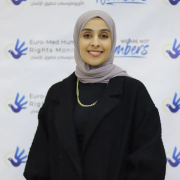
– Rania Taima is a Palestinian translator and graduate of Al Azhar University, Department of English Language and Translation. WANN contributed this story to The Palestine Chronicle.

